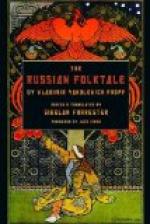REFERENCES
Century Co.: St.
Nicholas Magazine, 1915; St. Nicholas Fairy
Stories
Re-told.
Gates, Josephine:
“And Piped Those Children Back Again,”
(Pied
Piper) St.
Nicholas, Nov., 1914.
Hays, Ruth: “Greencap,” St. Nicholas, June, 1915.
Hazlitt, William; Essays.
("Wit and Humor.”) Camelot Series.
Scott.
Hooker, B.: “Narrative
and the Fairy Tale,” Bookman, 33:
June
and July,
1911, pp. 389-93, pp. 501-05.
Ibid: “Types
of Fairy Tales,” Forum, 40: Oct.,
1908, pp.
375-84.
Martin, John: John Martin’s Book (Magazine), 1915
Meredith, George: The Comic Spirit. Scribners.
Moulton, Alice O’Grady,
and Literature Committee: “Humorous
Tales”
Kindergarten Review, Dec, 1914.
Perry, Bliss: A
Study of Prose Fiction. ("The Romantic” and
“The
Realistic”) Houghton.
CHAPTER VI
SOURCES OF MATERIAL FOR FAIRY TALES: A LIST OF FAIRY TALES, PICTURES, PICTURE-BOOKS, POEMS, AND BOOKS
Shall we permit our children, without scruple, to hear any fables composed by any authors indifferently, and so to receive into their minds opinions generally the reverse of those which, when they are grown to manhood, we shall think they ought to entertain?—PLATO, in The Republic.
Any list of fairy tales for little children must be selected from those books which, as we have noted, contain the best collections of folk-lore, and from books which contain tales that rank as classics. An examination of the tales of Perrault, of Grimm, of Dasent, of Andersen, of Jacobs, of Harris, and of miscellaneous tales, to see what are suited to the little child, would result in the following lists of tales. Those most worthy of study for the kindergarten are marked with an asterisk and those suited to the first grade are marked “1.” No attempt has been made to mention all the varied sources of a tale or its best version. The Boston Public Library issues a Finding List of Fairy Tales and Folk Stories, which may be procured easily, and the Carnegie Library at Pittsburg issues in its monthly bulletin for December, 1913, vol. 18, no. 10, a List of Folk-Tales, and other stories which may be dramatized. The Baker, Taylor Company, in 1914, issued a Graded Guide to Supplementary Reading, which contains a list of many of the best editions of folk and fairy tales suited to primary grades. A list of school editions is included in this book. But one cannot fail to be impressed with the general low literary standard of many school editions of fairy tales when judged by the standards here applied to the tales themselves.—




